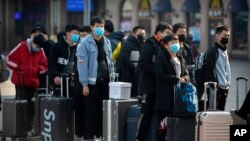The World Health Organization warns travel bans to limit the spread of the new coronavirus from China could backfire and lead to a worsening of the epidemic worldwide. Latest reports put the number of confirmed cases at nearly 12,000, including 259 deaths, with most of the cases and all of the deaths occurring in China.
A WHO emergency committee declared the coronavirus a global public health threat on Thursday, triggering a series of recommendations aimed at limiting the spread of the deadly disease.
WHO does not recommend any restrictions on travel and trade despite the rapid acceleration of the disease inside China and its steady, but relentless growth worldwide. More than 100 cases are reported in 22 other countries.
In response, some airlines have stopped flying to mainland China. The United States, which has declared the coronavirus a public health emergency, says it will deny entry to foreigners who recently visited China. Australia says it will take similar action.
WHO spokesman, Christian Lindmeier, says closing borders will not keep out the virus.
“As we know from other scenarios, be it Ebola or other cases, whenever people want to travel, they will. And, if the official paths are not open, they will find unofficial paths," said Lindmeier. "But the only way to control, to check fever, for example, to identify travel history, to try to monitor who is coming across your border and to see whether they have any signs of infection is through official border crossing points.”
Lindmeier says states have the sovereign right to take whatever measures they believe are best to protect their citizens.
“Yet, the recommendations stay. And, if travel restrictions are imposed, then we would hope these are as short-lived as possible to try to continue normal flow of life as good as possible," said Lindmeier. "But of course, increase surveillance and monitoring in order to avoid the spread of the disease.”
China is taking draconian measures to stop the spread of the coronavirus. Wuhan city, the epicenter of the disease and 15 other cities have been quarantined, placing an estimated 50 million people under lockdown.
Despite these efforts, the virus continues to spread at a rapid pace.






